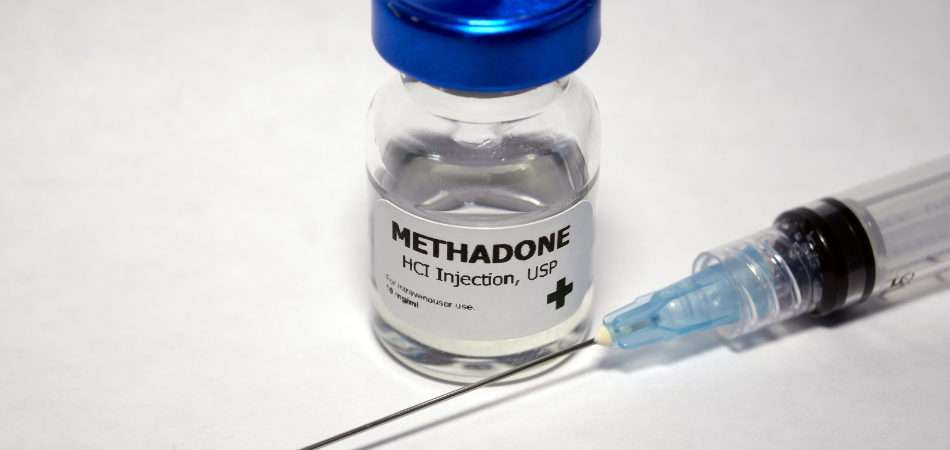
Written by:

Medically Reviewed by:
Last Updated:
February 17th, 2025
Methadone Addiction
What is methadone?
Methadone is a synthetic opioid primarily used to manage pain and treat opioid dependence, especially in heroin addiction. It works by reducing withdrawal symptoms and cravings without producing the intense ‘high’ associated with other opioids.
Medically speaking, it’s a long-acting drug that helps individuals gradually wean off opioids, making it a key component in opioid replacement therapy.
In the UK, methadone is a controlled substance, classified as a Class A drug under the Misuse of Drugs Act 1971. It’s only available through prescription and is tightly regulated due to its potential for abuse and addiction.
Methadone in the UK
In 2022, methadone prescriptions in the UK dropped by 3%, with 1,785,152 items dispensed compared to 1,836,787 in 2021. While it’s positive to see a small decline, this still highlights how many people rely on methadone to manage opioid addiction. It’s a reminder that opioid dependence remains a significant issue, and continued support is crucial for those in recovery.
This drop might indicate a shift towards alternative treatments, but anyone struggling must know there are options out there to help them find the right path to recovery.
How does methadone work, and is it addictive?
It can be confusing to learn that the very thing used to treat heroin addiction, methadone, can also be addictive itself. For someone already struggling with substance dependency, hearing that methadone has its own risks might cause uncertainty. But how does this drug work?
Methadone works in a similar way to heroin by acting on the brain’s opioid receptors. These receptors are responsible for controlling feelings of pain and pleasure. When methadone binds to these receptors, it reduces cravings and withdrawal symptoms in those recovering from heroin addiction.
However, just like heroin, methadone can also trigger a release of dopamine, which can lead to a sense of euphoria, though less intense than what heroin induces. This dopamine release is what makes methadone potentially addictive.
What’s the difference between heroin and methadone?
The difference between methadone and heroin lies in how they interact with the body over time. Heroin acts quickly and intensely, producing an immediate high that fades fast, often leading to frequent use to maintain the effect.
Methadone, on the other hand, has a much slower onset and longer duration, meaning it stays in the system longer and stabilises the body’s cravings for opioids. This extended action helps prevent the rapid cycling of highs and lows that heroin causes, offering a more controlled alternative.
Though methadone can still cause dependency, it’s often prescribed in carefully monitored doses to help those struggling with heroin addiction regain control of their lives without the chaotic swings caused by heroin.
Is methadone just replacing one addiction with another?
A common concern when starting methadone treatment is the fear that it’s simply replacing one addiction with another, but one of the biggest advantages of methadone is that it’s a much safer alternative to street heroin.
Heroin bought off the street is often laced with other harmful substances, which dramatically increases the risk of overdose and death. The purity and potency of street heroin are unpredictable, leading to accidental overdoses even for inexperienced users.
In contrast, methadone is a regulated medication provided in consistent doses, eliminating the danger of unintentional overdose from varying drug purity.
Also, methadone treatment programmes are medically monitored, meaning individuals are carefully monitored to ensure the dose is appropriate for their needs, minimising the risk of abuse. Over time, many people are able to taper down their methadone dosage, eventually moving towards a drug-free life.
Do I have a methadone addiction?
An addiction of any kind has the ability to sneak up on someone, often only revealing the extent of its damage long after the first use. This is especially true with drugs like methadone, which may have been introduced to manage pain or as part of opioid recovery.
The subtle nature of methadone addiction makes it crucial to regularly check in with yourself and honestly assess how you’re feeling. One of the best ways to do this is by asking yourself honest questions about your usage and overall well-being.
Here are five questions to consider. If you answer ‘yes’ to any of them, it could indicate a potential methadone addiction:
- Do you find yourself taking methadone more often or in higher doses than prescribed?
- Have you experienced strong cravings or urges to take methadone when it isn’t needed for pain or treatment?
- Are you feeling unable to function normally or deal with daily tasks without methadone?
- Do you feel anxious or agitated when you don’t have access to methadone or do you notice withdrawal symptoms when you try to reduce your intake?
- Have you kept your methadone use a secret from loved ones or felt ashamed about how much or how often you’re taking it?
If any of these resonate with you, it may be worth seeking further guidance or support.
Can I beat a methadone addiction?
Yes, you absolutely can beat a methadone addiction, especially with the right support, and Liberty House is here to help you every step of the way. Our dedicated methadone addiction treatment programme is designed to guide you through recovery in a safe, supportive and compassionate environment.
At Liberty House, we offer a structured detox with 24/7 medical staff on hand to monitor your progress and manage any withdrawal symptoms that might arise. Following detox, we provide a range of therapies tailored to your needs, including one-to-one counselling, group therapy and holistic therapies such as yoga and art. These help to address both the physical and psychological aspects of methadone addiction.
Our aftercare programme ensures that once you leave Liberty House, you have the continued support and resources you need to maintain long-term sobriety. If you or someone you care about is struggling with methadone addiction, Liberty House is ready to help you reclaim your life. Reach out to us today.
Frequently Asked Questions
(Click here to see works cited)
- “The Safer Management of Controlled Drugs: Annual Update 2022.” National Trends in the Prescribing of Controlled Drugs – Care Quality Commission, www.cqc.org.uk/publications/safer-management-controlled-drugs-annual-update-2022/national-trends-prescribing-controlled-drugs. Accessed 23 Oct. 2024.






